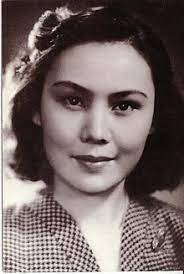Pai Yang (c. 1920-), was a leading film actress known for her performances in such productions as I-chiang ch'un-shui hsiang-tung liu. Little is known about Pai Yang's family background or personal life. According to some sources, she was born in Peking in 1920, and she began her stage career at the age of 12 when she passed the entrance examinations for the Peking branch training school of the Lien-hua ying-yeh kung-ssu [united photoplay service]. Other sources give her birthplace as Hsiangt'an, Hunan, and her birthdate as 1916. In any event, she was a graduate of the Peiping Institute of Dramatic Art, and she began her professional career as a member of the Chungkuo lu-hsing chü-t'uan [China traveling dramatic troupe], headed byT'ang Huai-ch'iu. She also took part in some of the rural productions staged by Hsiung Fo-hsi (q.v.). Her vivacious acting and personality soon brought her recognition, and it seems likely that she would have become China's premier legitimate actress if she had not decided to enter the film world. The first film in which Pai Yang appeared was made in 1936 and was shown in Shanghai in 1937. Entitled Shih-tzu chieh-Vou [at the crossroads], the film was directed by Shen Hsi-ling and produced at the Ming-hsing ying-p'ien kung-ssu [star film company studios], with Chao Tan as the male lead. The film, which was concerned with unemployment problems, contained much implicit social criticism. Its anti-Japanese bias was sufficiently strong for the Shanghai Municipal Council to order one scene cut in deference to possible Japanese sensitivity. Shih-tzu chieh-Vou brought Pai Yang to the forefront as a screen actress, and she became a favorite of a more critical public than had existed previously. She and Hu Tieh (q.v.) became the two leading stars of their day, and a number of critics and other intellectuals preferred the performance of Pai Yang to those of her colleague.
Some of Pai Yang's more popular feature films were She-hui-chih-hua [the flower of society], of 1937; Chung-hua erh-nü [daughter of China], of 1939; and Ching-nien Chung-kuo [young China], of 1941. Perhaps the film for which she is best remembered by the postwar generation was the marathon production (really two films), Pachien li-lu yün-ho-yueh [eight thousand leagues away lie the clouds and the moon] and Pa-nien wan-luan [eight years of chaos], the first being made in 1946 and the second in 1947. The double production was screened in 1947 under the title I-chiang ch'un-shui hsiang-tung liu, rendered in English as The Tears of the Yangtze. The film depicted the vicissitudes of the people in wartime China against a background of corrupt government administration. It took four hours to screen, and it broke all box-office records in Shanghai by running for eighty-four consecutive days. The producer was the K'un-lun ying-yeh kung-ssu [K'un-lun film company].
During the Sino-Japanese war years, which she spent in Chungking, Pai Yang married the playwright and Western theater specialist Chang Chün-hsiang (q.v.). They later divorced. After the Chinese Communists came to power, Pai Yang remained in China and continued to appear in films. Two notable ones were Wei-liao ho-p'ing [in the cause of peace], which was made in 1954, and Chu-fu [the blessing], which was released in 1956.
An honored figure in the People's Republic of China, Pai Yang was voted the nation's most popular screen actress in a public poll taken in the mid-1950s. She took part in public affairs in the 1950s by reading poetry before large audiences in Shanghai, going abroad as a member of various cultural missions, and serving as vice chairman of the China Film Workers Union. During this period, Pai Yang married Chiang Chün-ch'ao, a film director and former actor. They had two children: a girl and a boy. Pai Yun-t'i: see Buyantai. Panchen Lama (Ninth) Tibetan. Lop-sang Tub-dan Ju-gye I-ma Go-lok La-mu-gye Secular. Erdeni Chuyi-Geltseng

白杨
白杨(1920——),著名电影女演员,以演出《一江春永向东流》等影片而知名。
白杨的家庭出身和个人生活不详。据一些村料说;她于1920年出生在北京,十二岁时考入联华影业公司北京分校训练班后开始了舞台生涯。又有一些材料说她于1916年生在湖南湘潭。总之,她自毕业于北平戏剧专科学校后,加人唐槐秋领导的“中国旅行剧团”,开始了她的职业演员的生活,她也参加演出了熊佛西的一些描写乡村的剧作。她的生动演技和个性当即为人所注视,看来如果她后来不从事电影艺术,也必将成为一名领衔的正统女伶。
白杨演出的第一部电影,是1936年摄制、1937年放映的《十字街头》。这是与赵丹一起主演,沈西苓导演的明星影片公司出品。影片以失业问题为主题,对社会进行了很多暗示的批判。由于影片有着很强烈的反日倾向,上海工部局曾下令将其中的一个镜头剪掉以免刺激日本人。《十字街头》把白场置于电影女演员的前列,由此,她也为前所未有的富于批判精神的观众所喜爱。她和胡蝶成为当时两名著名明星,不少批评家和其他知识分子在她们两人中更欣赏白杨的演出。
白杨又演出了另一些更流行的电影,如1937年的《社会之花》,1939年的《中华儿女》,1941年的《青年中国》。其在战后最为人所不能忘怀的是部
长片,即1946年拍摄的《八千里路云和月》和1947年拍摄的《八年离乱》,1947年合并称为《一江春水向东流》,英文详名为“扬子江的泪水”。影片以反对腐败的政府当局为背景,描写了中国人民在抗战时期的变迁。影片长达四小时,在上海曾连续放映八十四天,创造了最高的票房记录。这部影片是昆仑影业公司的岀品。
白杨在中日战争期间住在重庆,和剧作家、西洋戏剧专家张骏祥结婚。后来他们离婚了。共产党取得政权后,白杨仍在国内继续演电影。其中令人注意的两部片子,是1954年摄制的《为了和平》,1956年摄制的《祝福》。五十年代中,作为中华人民共和国享有荣誉的人物,她被观众投票选为全国最佳女演员。她又参与公众活动,在上海听众面前朗诵诗歌,又为执行不同的文化使命而出国,还担任电影工作者联合会副主席。此时,她又与当过演员的电影导演蒋君超结婚,生有一子一女。